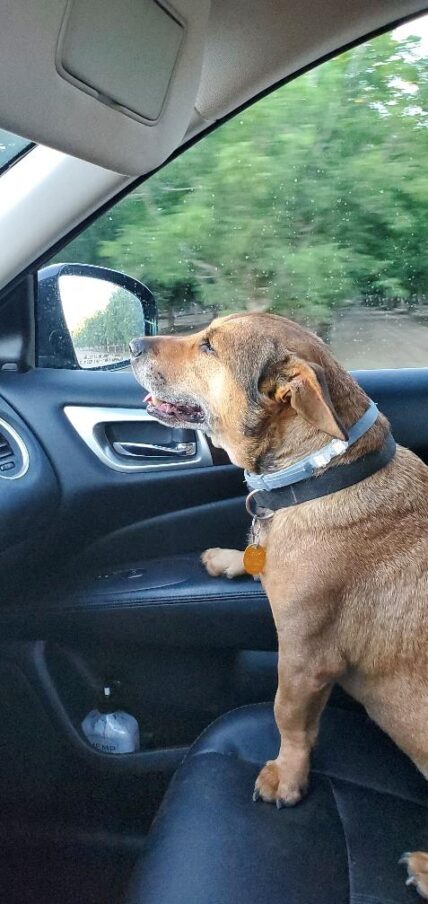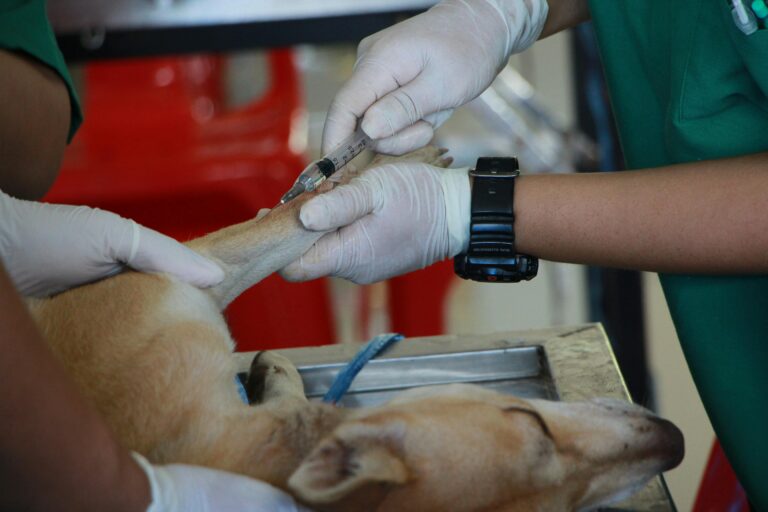This Staffy Dog Would ‘Scream in Pain’ Until Vet Discovered Mystery Illness Ailing Her
A Staffordshire Bull Terrier dog owner on TikTok has left internet users heartbroken after revealing the health condition ailing her TikTok-famous Staffy named Maggie. According to a video on account @maggiepotamus, it all started when Maggie suddenly began experiencing difficulty walking and extreme pain. (watch video below)
“Yesterday I woke up to my dog screaming in pain. She was walking and sitting weird but I couldn’t find the location of the pain. The first vet said it was likely just a sore neck and wanted to wait for X-rays. But the pain kept getting worse, she started losing control of her hind legs and was peeing on herself,” read part of the text accompanying the clip.

Maggie’s owner said she sought a second opinion from an emergency vet, who suspected that this sweet Staffy suffered from a herniated disc. “So we went to the emergency vet and they think it’s a herniated disc. She stayed overnight and will meet the ortho surgeon today. Please send all your healing and energy her way,” she concluded.
So far, thousands of TikTok users have taken to the comment section to narrate their dogs’ experiences with herniated disc.
“My Pitty had this same issue, we did electroacupuncture. It was a life saver, no surgery needed. Went from no use of the back legs to sprinting around the yard like a greyhound,” wrote one user.
“This happened with our large breed as well. They gave him some meds and in 2 weeks he was back to normal,” another shared.
“So stressful!! My dog had a really bad herniated disc and she had to have spinal surgery. Expensive and long recovery but she runs around like crazy now,” a third user commented.
Watch the video below:
@maggiepotamus_ ♬ In the Forest – Lesfm & Olexy
What Is a Herniated Disc in Dogs?
Herniated Disc — also referred to as slipped disc, Intervertebral Disc Herniation (IVDH), or Intervertebral Disc Disease (IVDD) — is a painful spinal cord condition that can affect all breeds of dogs. However, it’s more commonly seen in breeds like the Dachshund, French Bulldog, Beagle, Shih Tzu, Pekingese, and Cocker Spaniel.
Your dog’s spinal cord is lined with intervertebral discs that cushion the spinal cord from injury and offer added flexibility to the spine. Herniated disc in dogs occurs when an intervertebral disc slips out of its normal position, and it’s either pushed sideways, downwards, or up the spinal cord. This is mostly triggered by trauma to the spinal cord or the canine aging process, which can cause disc degeneration.
When an intervertebral disc herniates, it may bruise or put pressure on the spinal cord, causing pain and various neurological symptoms.
“Some dogs can go from normal walking to total paralysis in less than one hour,” explained veterinarian Dr. Adam Christman of DVM 360 in a TikTok video.
Herniated disc can occur on any part of the spine, including the neck.
Herniated Disc in Dogs Symptoms
When your dog is suffering from herniated disc, the severity of their symptoms will mostly depend on how many of these discs have slipped from their position.
If you’ve ever had thoughts such as “herniated disc in dog’s back symptoms,” or “herniated disc in dog’s neck symptoms,” here are the common symptoms associated with herniated discs:
- Pain in the back or neck
- Walking with an arched back or lowered head
- Whining when touched on the back or neck area
- Inability to walk or stand
- Avoids lying down in certain positions
- Stiffness in the limbs or neck
- Body shivering/ twitching of muscles
- Loss of bladder and bowel control (doggy diapers will help in this case)
- Loss of sensation on the toes
- Paralysis
“My old Pit Bull mix had a herniated disc in his neck and it was extremely painful for him. It was horrible the way he would scream. It was the worst thing I’ve experienced with a dog, so bad I thought I might lose him. Fortunately, it healed after months of drugs………he lived five more years without any recurrence,” commented one user in a Reddit discussion on herniated discs in dogs.
Treatment & Recovery of Dogs With Herniated Disc
If your dog exhibits signs of herniated disc, it’s important to see the vet immediately to prevent their spinal cord from sustaining further damage.
“It’s so, so crucial to have your veterinarian examine and make the diagnosis of it,” advises Dr. Adam Christman.
Usually, diagnosis of herniated discs involves a physical and neurological examination and the use of other diagnostic tools such as X-rays, MRIs, or CT scans. According to the Cornell University College of Veterinary Medicine, the treatment of herniated discs varies from dog to dog depending on the severity of the symptoms.
There are two forms of treatment for this condition:
1. Conservative Treatment
This type of treatment is often recommended for dogs with mild clinical symptoms of herniated discs. Conservative treatment entails the use of pain medications, muscle relaxants, physical therapy, and confining your dog in a crate to restrict unnecessary movement (and stabilize their back), among other non-invasive treatments.
For conservative treatment to be a success, one must strictly adhere to the veterinarian’s instructions.
2. Surgical Treatments
Surgery is often recommended for dogs with severe symptoms, a repeated case of herniated discs, or those who have failed to recover after undergoing conservative treatment.
In both cases, the sooner your dog starts treatment, the better the outcomes. The good news is that more often than not, dogs recover completely from herniated disc. While there’s no universal recovery time for dogs diagnosed with herniated discs, the recovery duration largely depends on how soon you seek treatment and the severity of their condition.
Alternative Treatments
Besides getting adequate rest, physical rehabilitation is also key in helping a dog make a full recovery from herniated discs. Rehabilitation — often recommended after your dog finishes a few weeks of strict crate rest — can include techniques such as water therapy, acupuncture, cold therapy, ozone therapy and laser therapy.
“My pumpkin’s best recovery was from acupuncture. I was skeptical, but it works. She regained so much function, well, spinal walking, but it improved her quality of life for years,” wrote user @txvacil in a Reddit discussion on slipped discs in dogs.
“My Corgi had a herniated disc when he was about 7. It may have not been a serious case but we were able to rehab him with anti-inflammatory meds, pain pills….and extremely strict limited mobility. For six weeks, he was crated at all times except when I picked him up and carried him outside to use the bathroom….the disc healed and he has been fine, with no recurrence,” wrote user @kimau2k in another Reddit discussion on herniated discs.
Herniated Discs in Dogs FAQs
What is herniated disc in a dog?
Herniated disc occurs when an intervertebral disc along your dog’s spinal cord slips from its normal position, causing spinal cord compression and other issues.
Can a herniated disc in dogs heal?
Yes, a dog can make a full recovery from herniated disc with timely, appropriate treatment and proper aftercare.
Herniated disc in dogs surgery
As stated earlier, surgery is often recommended for dogs with a severe case of herniated disc.
Herniated disc in dogs recovery
The recovery duration varies depending on the extent of the herniated disc symptoms and aftercare following treatment.
What are the symptoms of IVDD?
Among the common symptoms of IVDD include loss of coordination, inability to stand or sit comfortably, whining when touched on the neck and back area, and paralysis.









